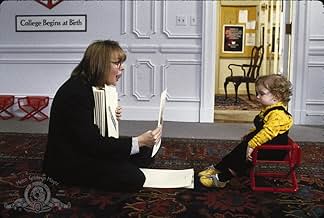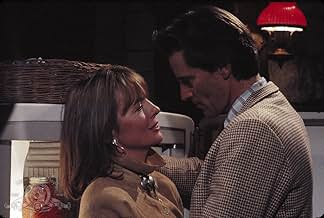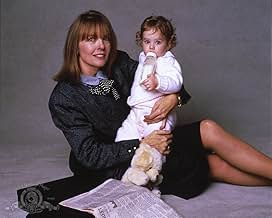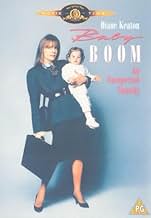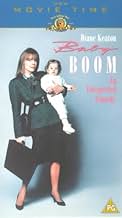CALIFICACIÓN DE IMDb
6.3/10
20 k
TU CALIFICACIÓN
La vida de J.C. está en crisis cuando hereda un bebé de un pariente lejano.La vida de J.C. está en crisis cuando hereda un bebé de un pariente lejano.La vida de J.C. está en crisis cuando hereda un bebé de un pariente lejano.
- Premios
- 5 nominaciones en total
- Dirección
- Guionistas
- Todo el elenco y el equipo
- Producción, taquilla y más en IMDbPro
Opiniones destacadas
I saw this movie years ago and enjoyed it for Diane Keaton's performance. Having revisited it in 2012, I realized that we have changed A LOT. The fast paced "Tiger Lady" that J.C. Wiatt portrays still exist, but imagine what her life would've been like if the internet was still possible. It's really hard not to root for her. J.C. is a windup toy that is wound too tight. A life on a ticking clock. So driven to succeed that she doesn't even realize when she obtains success. The fine line that Keaton skates is dated (unfortunately). A lot of this schtick wouldn't hold to today's audience, but in the context of the era, it's a great reminder of the yuppies that dominated the Reagan era.
Cue in, cute baby. She does what the story needs her to do, which is to slow down Keaton's life. Force her to see what's important. And the message is WAY too predictable but...it's still a nice journey. Again, if you follow Keaton's work, this is a very nice film that allows her to juggle through her neurosis. And it has a LOT of fun moments. It made me miss the 80's.
Cue in, cute baby. She does what the story needs her to do, which is to slow down Keaton's life. Force her to see what's important. And the message is WAY too predictable but...it's still a nice journey. Again, if you follow Keaton's work, this is a very nice film that allows her to juggle through her neurosis. And it has a LOT of fun moments. It made me miss the 80's.
Sweeter than sugar Keaton is delightfully charming in this pleasant comedy about a high powered business executive who lives in her work, until she inherits a baby girl from distant relatives who have been killed. Lovely all the way through with a witty script from Nancy Meyers and Charles Shyer and good support from the always wonderful Shepard and from Sam Wannamaker.
It's easy to be cynical about Baby Boom for all it's cuteness, cliches and high concept comedy about a 'yuppie' businesswoman juggling her career with looking after a baby after unexpectedly inheriting one from a distant relative. The soundtrack, power dressing, high energy and 'greed is good' attitude is all very 1980's and it's the perfect star vehicle for Diane Keaton.
She has of course demonstrated her sense of comic timing, on-screen presence and dramatic ability many times before whilst working with Woody Allen but it's nice to see Keaton come into her own here and carry the movie. With a good supporting cast and husband & wife team of Charles Shyer and Nancy Myers at the helm, who scored many hits with similar romantic comedies since, this is a sweet, lighthearted diversion in a similar vein to Three Men and a Baby released the same year.
The film is almost in two halves, the first half is set in the high rolling corporate world of New York, where Keaton's character is at the top of her game and making waves as a woman set to become a partner of a large corporation, whose lifestyle and career aspirations are thrown into turmoil when the baby comes into her life. The second half is where she retreats to the country after effectively being fired from her job in the City and sets up a cottage industry selling baby food that is so successful it brings her back to the corporate world on her own terms.
It is of course an unlikely scenario and more of an urban fairy tale but it is so likeable and good natured that you can overlook the cliches and spoonfuls of schmaltz it delivers and enjoy being swept along by Keaton's funny and charming performance.
She has of course demonstrated her sense of comic timing, on-screen presence and dramatic ability many times before whilst working with Woody Allen but it's nice to see Keaton come into her own here and carry the movie. With a good supporting cast and husband & wife team of Charles Shyer and Nancy Myers at the helm, who scored many hits with similar romantic comedies since, this is a sweet, lighthearted diversion in a similar vein to Three Men and a Baby released the same year.
The film is almost in two halves, the first half is set in the high rolling corporate world of New York, where Keaton's character is at the top of her game and making waves as a woman set to become a partner of a large corporation, whose lifestyle and career aspirations are thrown into turmoil when the baby comes into her life. The second half is where she retreats to the country after effectively being fired from her job in the City and sets up a cottage industry selling baby food that is so successful it brings her back to the corporate world on her own terms.
It is of course an unlikely scenario and more of an urban fairy tale but it is so likeable and good natured that you can overlook the cliches and spoonfuls of schmaltz it delivers and enjoy being swept along by Keaton's funny and charming performance.
Diane Keaton IS this movie. Without her, it wouldn't have worked so well. Funny and touching, with a bit of sophisication.
As anyone who has walked a mile or two knows, life is about choices and making decisions. And a lot of that has to do with realizing and setting priorities, because-- as a wise person once said-- You Can't Have It All. It's the lesson we all learn in our own way in our own time, according to our own personal situation, and director Charles Shyer examines one of them in his amiable comedy, `Baby Boom,' starring Diane Keaton.
J.C. Wiatt (Keaton) is a high-powered businesswoman on the fast track to success; she knows what she wants, has set her priorities, and a partnership in the firm for which she works is on the horizon. Her live-in significant other, Steven (Harold Ramis), is of a like mind-set, so they complement one another's life style perfectly. Marriage and/or having children is in neither of their respective vocabularies. then one day, J.C. `inherits' a baby, the child of a distant relative (a cousin she'd met only once) who has been killed in a tragic accident, and suddenly, J.C.'s world is turned upside down. Keeping the baby is out of the question, of course. Or is it? For J.C., it just may not be as simple as it seems, initially. She's been living life on her own terms, but now she is once again faced with choices, decisions and setting priorities. And along the way, she learns one of life's most important lessons: The fact that the lesson never ends.
There's some amusing moments and some insights to be gleaned from Shyer's film, and overall it's a pleasant, enjoyable experience. It is not, however, an entirely original idea, and Shyer laces it with stereotypes and cliches to boot. This is not necessarily a bad thing, though. If his characters are stereotypical, it's because they reflect a certain realism. J.C.'s boss, Fritz Curtis (Sam Wanamaker), for instance, typifies the image of a dedicated, hard-core businessman whom you get the feeling has to consult his day planner to work in an appointment with his own family. A stereotype? Perhaps. A reflection of reality? Definitely. The same can be said for Sam Shepard's character, Dr. Jeff Cooper, who personifies the general image of one in his situation. And again, it is a reflection of reality, stereotypical though it may be.
Even the cliches are handled in a way that makes them fresh enough to work within the context of the story, and be appreciated-- especially by those in the audience who may have experienced any of the situations presented here. When J.C. fumbles with a diaper and becomes frustrated with her own inexperience and incompetence with such things, it's cliche, but it also rings true-to-life. The important thing is, it's all well presented and actually pretty funny stuff, even if it isn't anything new.
Shyer wrote the screenplay, along with Nancy Meyers, and one angle they may have failed to cultivate fully has to do with Ken, the character played by James Spader. As J.C.'s in-house adversary, also striving to climb the corporate ladder, it may have been intrinsically more interesting had the character been a woman. The fact that Ken is a man, again, makes this particular situation fairly cliche; whereas a competitive conflict with another woman, considering J.C.'s predicament, would have expanded the avenues of possibility to a much greater extent, and certainly would have provided a more imaginative perspective.
The main reason the film works as well as it does, however, is because of the engaging performance by Diane Keaton. In J.C., she creates the antithesis of Annie Hall, but even at her most demanding there is a hint of vulnerability in J.C., a softness to that hard exterior edge she uses to shoulder her way through the business world. Keaton gives you a real sense of the conflict she's experiencing, and though it's lightheartedly rendered for the most part, you understand the underlying seriousness of it all. And the scene in which she vents her frustrations and bares her soul to Dr. Cooper is classic. Keaton's work is without question the highlight of the film, and what really brings it to life.
The supporting cast includes Pat Hingle (Hughes Larabee), Britt Leach (Verne), Kim Sebastian (Robin), Mary Gross) Charlotte, Patricia Estrin (Secretary)Victoria Jackson (Eve), Jane Elliot (Park Mom) and Linda Ellerbee (Narrator). An upbeat, entertaining film, `Baby Boom' may not be particularly memorable, but it does provide some laughs, and at the same time says something about the value of being given the opportunity to question the things we `think' we want. Kind of like saying `Never say never.' After all, who can say with any certainty where destiny may lead any of us? It's something a film like this may make you consider, inbetween the chuckles. It's the magic of the movies. I rate this one 7/10.
J.C. Wiatt (Keaton) is a high-powered businesswoman on the fast track to success; she knows what she wants, has set her priorities, and a partnership in the firm for which she works is on the horizon. Her live-in significant other, Steven (Harold Ramis), is of a like mind-set, so they complement one another's life style perfectly. Marriage and/or having children is in neither of their respective vocabularies. then one day, J.C. `inherits' a baby, the child of a distant relative (a cousin she'd met only once) who has been killed in a tragic accident, and suddenly, J.C.'s world is turned upside down. Keeping the baby is out of the question, of course. Or is it? For J.C., it just may not be as simple as it seems, initially. She's been living life on her own terms, but now she is once again faced with choices, decisions and setting priorities. And along the way, she learns one of life's most important lessons: The fact that the lesson never ends.
There's some amusing moments and some insights to be gleaned from Shyer's film, and overall it's a pleasant, enjoyable experience. It is not, however, an entirely original idea, and Shyer laces it with stereotypes and cliches to boot. This is not necessarily a bad thing, though. If his characters are stereotypical, it's because they reflect a certain realism. J.C.'s boss, Fritz Curtis (Sam Wanamaker), for instance, typifies the image of a dedicated, hard-core businessman whom you get the feeling has to consult his day planner to work in an appointment with his own family. A stereotype? Perhaps. A reflection of reality? Definitely. The same can be said for Sam Shepard's character, Dr. Jeff Cooper, who personifies the general image of one in his situation. And again, it is a reflection of reality, stereotypical though it may be.
Even the cliches are handled in a way that makes them fresh enough to work within the context of the story, and be appreciated-- especially by those in the audience who may have experienced any of the situations presented here. When J.C. fumbles with a diaper and becomes frustrated with her own inexperience and incompetence with such things, it's cliche, but it also rings true-to-life. The important thing is, it's all well presented and actually pretty funny stuff, even if it isn't anything new.
Shyer wrote the screenplay, along with Nancy Meyers, and one angle they may have failed to cultivate fully has to do with Ken, the character played by James Spader. As J.C.'s in-house adversary, also striving to climb the corporate ladder, it may have been intrinsically more interesting had the character been a woman. The fact that Ken is a man, again, makes this particular situation fairly cliche; whereas a competitive conflict with another woman, considering J.C.'s predicament, would have expanded the avenues of possibility to a much greater extent, and certainly would have provided a more imaginative perspective.
The main reason the film works as well as it does, however, is because of the engaging performance by Diane Keaton. In J.C., she creates the antithesis of Annie Hall, but even at her most demanding there is a hint of vulnerability in J.C., a softness to that hard exterior edge she uses to shoulder her way through the business world. Keaton gives you a real sense of the conflict she's experiencing, and though it's lightheartedly rendered for the most part, you understand the underlying seriousness of it all. And the scene in which she vents her frustrations and bares her soul to Dr. Cooper is classic. Keaton's work is without question the highlight of the film, and what really brings it to life.
The supporting cast includes Pat Hingle (Hughes Larabee), Britt Leach (Verne), Kim Sebastian (Robin), Mary Gross) Charlotte, Patricia Estrin (Secretary)Victoria Jackson (Eve), Jane Elliot (Park Mom) and Linda Ellerbee (Narrator). An upbeat, entertaining film, `Baby Boom' may not be particularly memorable, but it does provide some laughs, and at the same time says something about the value of being given the opportunity to question the things we `think' we want. Kind of like saying `Never say never.' After all, who can say with any certainty where destiny may lead any of us? It's something a film like this may make you consider, inbetween the chuckles. It's the magic of the movies. I rate this one 7/10.
¿Sabías que…?
- TriviaWhen Kristina and Michelle Kennedy were in college, they found out that Diane Keaton was doing a book signing in Southampton, New York. They showed up and when Keaton was doing signings, they placed the photo for Keaton to sign. Keaton remarked on the photo that she'd been thinking about the twins the other day. When she went to sign, she looked at the sisters, back to the photo and realized it was them. Keaton subsequently got up and hugged them both. The sisters later went onto become teachers.
- ErroresIn the beginning of the film, the narrator states that J.C. has a corner office. When the office appears a few minutes later, it's in the middle, with a window.
- Citas
J.C. Wiatt: I can't have a baby because I have a 12:30 lunch meeting
- Versiones alternativasThe joint MGM/UA Communications Co. and United Artists logo are both plastered with the 1990s United Artists logo in the 1996 VHS, and MGM logo in the Blu-ray version. The latter also featured the closing MGM logo.
- Bandas sonorasEverchanging Times
Written by Burt Bacharach, Carole Bayer Sager and Bill Conti
Performed by Siedah Garrett
Courtesy of Qwest Records
Produced by Burt Bacharach, Carole Bayer Sager and David Foster
Selecciones populares
Inicia sesión para calificar y agrega a la lista de videos para obtener recomendaciones personalizadas
- How long is Baby Boom?Con tecnología de Alexa
Detalles
Taquilla
- Total en EE. UU. y Canadá
- USD 26,712,476
- Fin de semana de estreno en EE. UU. y Canadá
- USD 1,357,413
- 12 oct 1987
- Total a nivel mundial
- USD 26,712,476
- Tiempo de ejecución1 hora 50 minutos
- Color
- Mezcla de sonido
- Relación de aspecto
- 1.85 : 1
Contribuir a esta página
Sugiere una edición o agrega el contenido que falta

Principales brechas de datos
By what name was Baby Boom (1987) officially released in India in Hindi?
Responda

